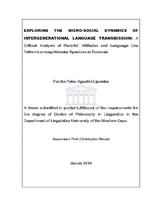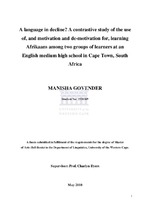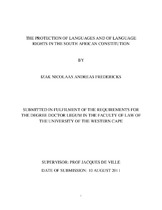What is the relationship between the home language and literacy backgrounds of Afrikaans-speaking learners and their proficiency in English?
Abstract
In this study, which is an example of three ethnographic type case studies, I explore the relationship between the literacy backgrounds and home language of Afrikaans speaking learners and their proficiency in English. My literature review mainly focuses on research pertaining to language-in-education in a South African context and where applicable, an international context. I identify two aspects, which are significant in the development of the three children's English proficiency' These aspects are the following: (i) The difference between the school language (LoLT) and home language of the three children. (ii) The difference between the school literacy practices and the home (or alternative) literacy practices. My thesis takes the view of the New Literacy Studies that literacy is situated socially and that children's literacy practices are shaped at home. I discuss the terms literacy practices and literacy events in terms of the social practices approach to literacy.
Theories about reading and writing include the emergent literacy approach according to which becoming literate is described as a process whereby reading, writing and oral language are all integral parts of literacy learning, I discuss the English language proficiency of the three children in terms of Cummins' (i981) development of two continua, of context embedded, cognitively undemanding communication and context reduced, cognitively demanding communication, which is an extension of the BICS and CALP theory in language development.
I reflect on how my experience as an English teacher in a multicultural township school indicates that the hegemony of English may influence school governing bodies to adopt assimilationist language policies. With reference to literacy, the term "assimilationist" refers to people choosing to learn a high-status language to the detriment of their own home language/s. The implications of such language choices
are the reinforcement of English and the continuing low status of their home language/s. I conclude this mini-thesis by making recommendations to stakeholders in education.
Related items
Showing items related by title, author, creator and subject.
-
Exploring the micro-social dynamics of intergenerational language transmission: a critical analysis of parents's attitudes and language use patterns among Ndamba speakers in Tanzania
Lipembe, Pembe Peter Agustini (University of the Western Cape, 2010)The study has several implications; for general theoretical traditions it highlights the point that ambivalent attitudes and incomplete language use are responsible for gradual language decline. Previous studies while ... -
A language in decline ? :a constrastive study of the use of, and motivation and de-motivation for, learning Afrikaans among two groups of learners at an English medium high school in Cape Town, South Africa
Govender, Manisha (University of the Western Cape, 2010)Afrikaans in practice replaced Dutch and became one of South Africa's official languages (along with English) from 1925. It reached the apex of its development and influence during the years of Nationalist party rule and ... -
The protection of languages and of language rights in the South African constitution
Fredericks, Izak Nicolaas Andreas (University of the Western cape, 2011)The 1996 South African Constitution contains a number of provisions that deal specifically with the protection of languages and of rights relating to language. The most important of these is section 6 which recognises 11 ...




